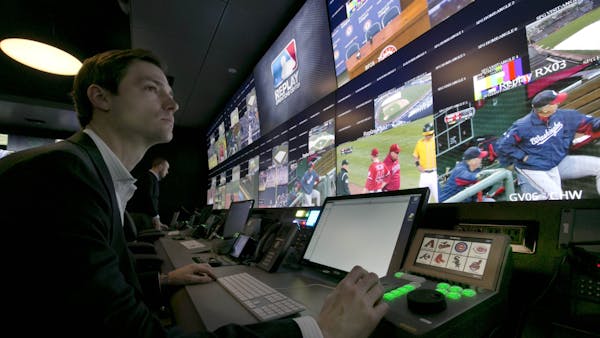how will it work?
1 The manager comes onto the field and announces he is challenging an umpire's call (no, there is not a red flag involved).
2 The crew chief, using an on-field headset, contacts the replay command center in New York, which will be staffed by umpires.
3 After viewing video feeds, a replay official decides whether to uphold or overturn the call. The decision goes back to the umpire.
What's reviewable?
• Home run
• Ground-rule double
• Fan interference
• Stadium boundary calls (e.g., fielder into stands, ball into stands triggering dead ball)
• Force play
• Tag play (including steals and pickoffs)
• Fair/foul in outfield only
• Trap play in outfield only
• Batter hit by pitch
• Timing play (whether a runner scores before a third out)
• Touching a base (requires appeal)
• Passing runners
• Record-keeping (ball-strike count to a batter, outs, score and substitutions)
More questions
Q How many challenges does a manager get?
A Each manager can challenge one call per game. If the challenge is successful, the manager gets a second challenge. If a manager is out of challenges — and if the game is in the seventh inning or later — the umpires can call for video review.
Q What's not reviewable?
A In addition to balls and strikes, managers cannot challenge obstruction, interference calls and check swings. Also, the so-called "neighborhood play" will stand, with the second baseman or shortstop not strictly required to tag second base if he is vulnerable to a sliding runner. However, the umpires may still convene on the field at any time to discuss a play.
Q Will there be changes to the way home runs are reviewed?
A Home run calls that have in the past been subject to instant replay review will continue to be reviewed at the crew chief's discretion. Managers may request that an umpire review a home run call, but they cannot challenge home run calls.
news services

As baseball's elbow injuries rise, Twins pitchers understand the risks
Paris Olympics opening ceremony on river Seine will last nearly 4 hours

Wolves vs. Suns: Here are the match-ups . . . and a series prediction

The Twins sell tickets with all-you-can-eat classic concession fare. Are they worth it?

